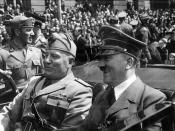In his preface, Kershaw admits that he too was a reluctant biographer, arriving at the writing of a biography of Hitler from 'the wrong direction'. Here Kershaw's sympathies for the 'structuralist' approaches to Nazi rule become apparent. 'Structuralis ts' challenge the 'intentionalist' argument that Hitler can be seen as the 'programmatist' implementing systematically his ideological objectives. The 'structuralists' do not deny the centrality of Hitler to Nazism, rather they focus on the 'struct ural' context of decision making and the role of 'traditional elites' in running the Third Reich and Hitler's inability (or unwillingness) to keep this chaos in check. This shift in emphasis has, inevitably, tended to downgrade the importance of Hitler wh o, in Hans Mommsen's famous phrase, was in some respects a 'weak dictator'.
These historiographical tensions provide an insight into Kershaw's approach and explains why Hitler 1889-1936: Hubris constitutes a different type biography to the more traditional approach found in Bullock's masterpiece (Hitler: A Study in T yranny, 1952; rev.
ed., 1964) or Jochim Fest's brilliant analysis of the psychological forces driving Hitler's character (Hitler, 1974). Moreover, Kershaw is less interested in the inner psychology or the private life that one finds in recent p opulist works such as Rosenbaum's Explaining Hitler. The Search for the Origins of his Evil (New York, 1998); mercifully he also pulls back from controversial psychoanalytical speculation that underpinned so many abysmal psychobiographies of the 19 70s. Kershaw is more concerned to analyze the nature of Hitler's power; how he gained power and how he used it - or was allowed to use it by those around him. Thus for Kershaw, Hitler provides a vehicle to allow him to write an analysis of the wider socia l and political forces in Germany. To this end, Kershaw is shrewd enough to look...



References
Where are the references the material came from?
0 out of 0 people found this comment useful.